In this weekly review of important Court judgments, we look at Supreme Court’s observation regarding a sale deed executed for a property, Patna High court’s remarks regarding the custody of a minor child, Madras High court’s observation on not requiring a writ petition when there are alternative solutions in place and Delhi High court’s observation regarding custodial interrogation & granting of anticipatory bail.
Patna HC: Father’s custody of Minor below five years is not illegal as per Guardians & Wards Act
In the case of Smt. G.S.S Sitara vs. The State of Bihar & Ors, Justice Ashwani Kumar Singh remarked that custody of a child aged below five years with the father cannot be said to be illegal. However, despite these remarks, the court ruled in favour of the mother, considering other factors.
As far as the case is concerned, the petitioner and the respondent in the case had marital discord and have two children – one female & one male. In view of the anger issues related to the respondent i.e., the father, the petitioner was living separately with the two children. In the present case, it is alleged that the father took the girl child who is less than three years, stating that the child would be returned to the mother after two days. But he failed to do so and has continued to not give the child back to the petitioner.
Separately, the petitioner has also filed a maintenance petition and her mother has also filed a case related to domestic violence. In the petition, the mother has further stated that the father is not in a situation to provide care to the child, in view of his professional work.
In his observations, the judge remarked that, as per Section 6(a) of Guardians and Wards Act, 1956, the father is the natural guardian of a boy or an unmarried girl and as per Section 6, clause (a), after the father, the mother is a guardian. However, there is an exception to this clause which says that the custody of a minor who has not completed the age of five years shall ordinarily be with the mother.
The Judge remarked that, although there is an exception it does not render the custody of a minor child illegal.
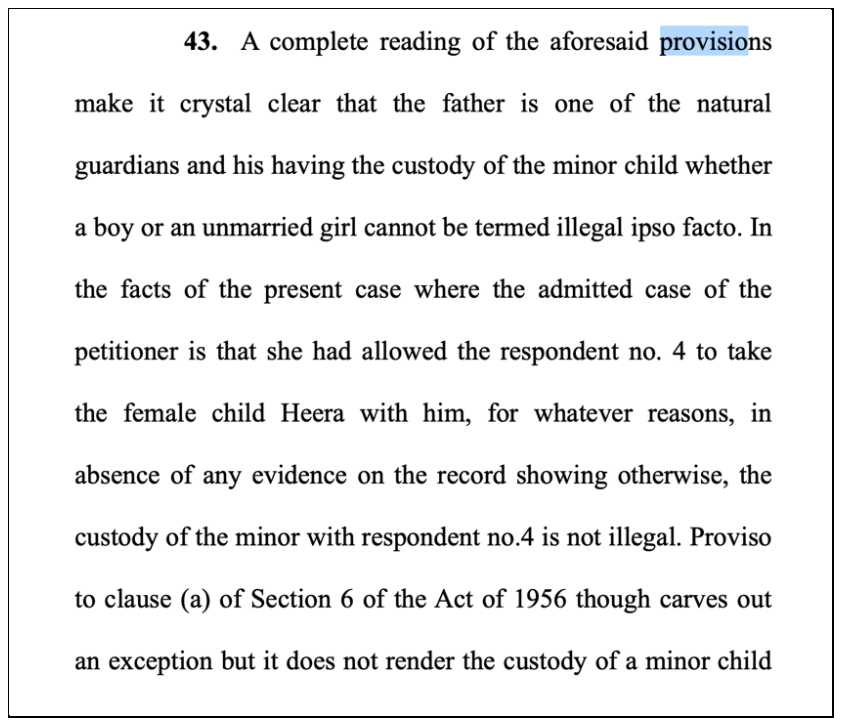
The Bench added that Section 13 of the Act is the guiding factor, where-in the welfare of the minor is of paramount consideration and the court needs to consider the “best interest of the child test.”.
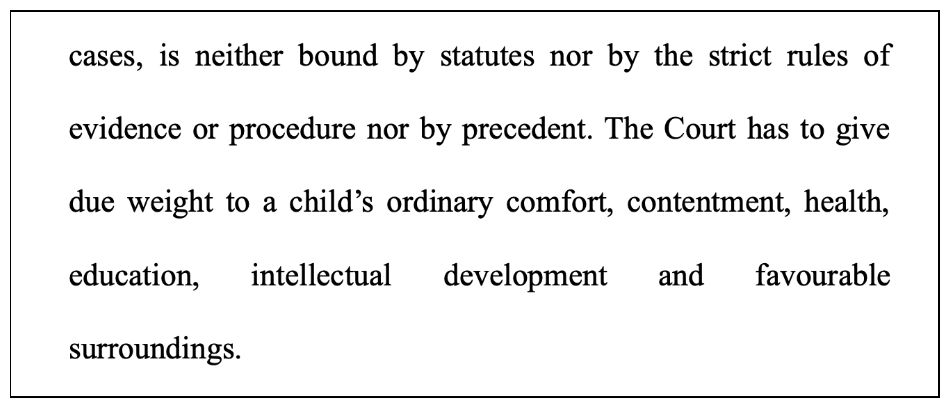
In view of the details of the case and the situation, the court has granted the custody to mother.
Madras HC: Writ Petition is not maintainable to enforce the Arbitral Award
Responding to a Writ Petition, the Single Bench of Justice G.K Ilanthiraiyan of the High Court of Madras observed that a Writ petition cannot be filed to enforce the arbitral award if an alternative remedy is already available in Arbitration and Conciliation Act, 1996 (A&C act), which in itself is a complete code.
In the case of D. Nagarathinammal vs. The Project Director, National Highways Authority of India and Anr., the respondent i.e., the National highway authority of India (NHAI) acquired lands from the petitioners for constructing a By-pass on the National Highway. The petitioners were aggrieved with the compensation provided and filed a reference before the arbitrator for enhancement of the compensation. The arbitrator enhanced the compensation accordingly.
The petitioners approached NHAI for the arbitral award but there was no response. Hence, they filed a writ petition directing NHAI to pay the award. NHAI i.e., the respondent stated that the writ petition is not maintainable because the petitioners have an option of filing for the enforcements within the Arbitration and Conciliation Act, 1996, itself.
The Court observed that there is no restriction on filing a writ petition for matters arising out of arbitration, but it would be entertained only in exceptional circumstances. The court acknowledged the counts under which the petitioner has filed a writ petition including, that there is a delay of more than a year to provide the compensation. But it observed that the petitioner has filed a writ petition instead of filing an enforcement application under A&C Act provisions.
Hence, the court made an observation that a writ petition cannot be filed for enforcement of an arbitral award where an alternate remedy is available.
Further, the court directed NHAI to deposit the enhanced amount along with interest with the competent authority, who ought to disburse the amount to the petitioners in case NHAI fails to obtain interim relief against the award within four weeks.
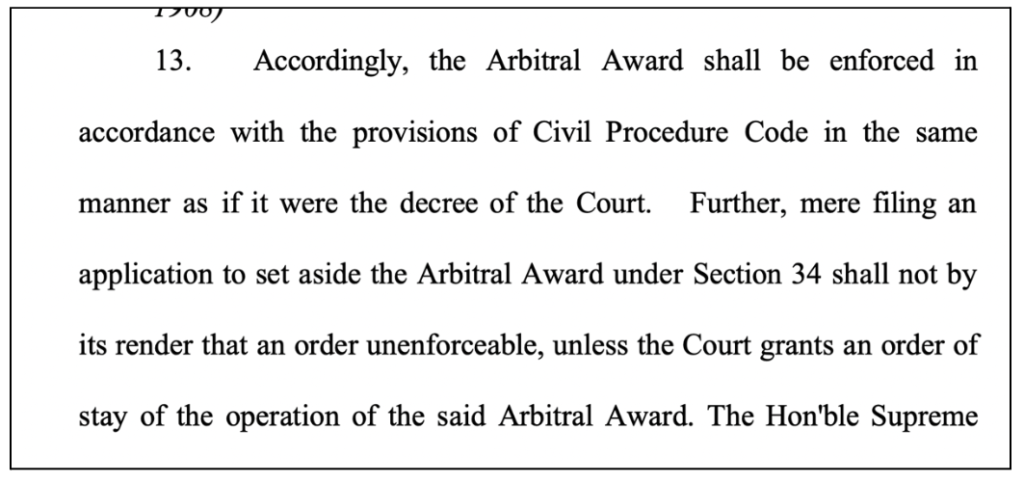
Delhi HC: While custodial interrogation is an effective method for crime-solving, personal liberty also needs to be balanced.
In the case Mukesh Khurana vs. State of NCT Delhi, Justice Asha Menon has granted the plea seeking anticipatory bail in connection to an FIR registered under Sections 420, 406 & 34 of IPC.
The FIR was lodged by an authorised representative of M/s. Vaishali Infratech Pvt. Ltd, on allegations of cheating & misappropriation.
The bail applicant was a builder, in whose project the complainant has booked 11 flats and an amount of Rs. 1.33 crores were paid up as 75% consideration. Mukesh Khurana, the applicant was the promoter and Director of M/s. Rudra Buildwell Pvt. Ltd. Although the flats were to be constructed and handed over by 2018, the complainant did not receive the handover. The complainant has further come across a charge intimation to the Registrar of the companies filed by the builder regarding the sale of the very same 11 flats to others.
The court observed that interrogation of the suspect is an effective way of crime-solving but the personal liberty of the individual also needs to be considered.
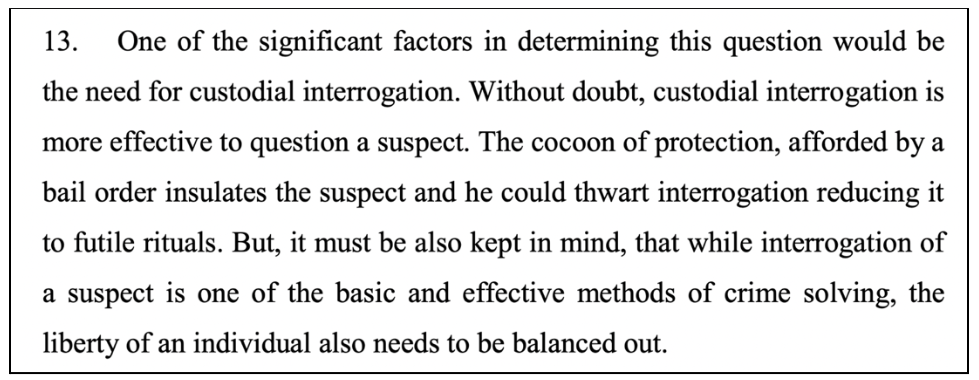
The merit and facts of each case would determine the bail application. In this case, since the interrogation would not be hampered without the custodial interrogation, anticipatory bail was granted.
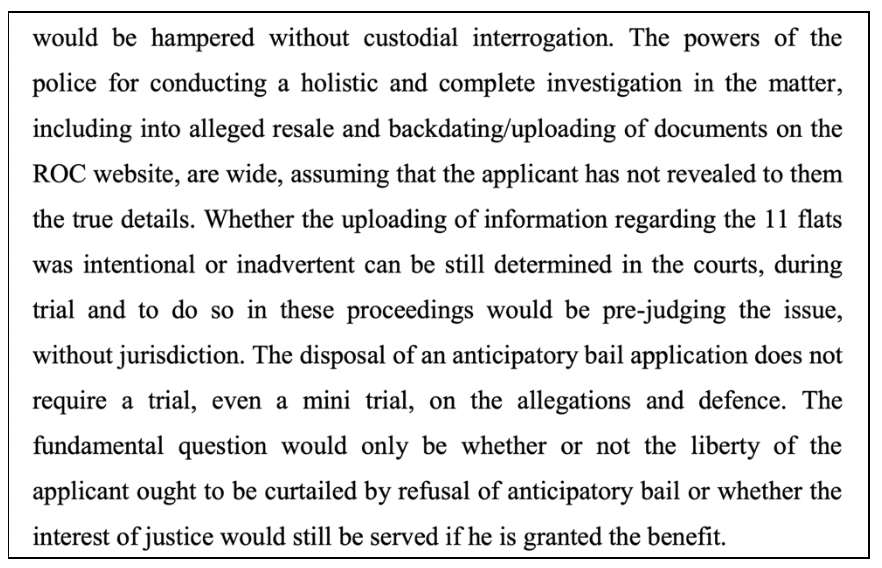
Supreme Court: Once the vendor admits execution of agreement & payment of consideration, nothing further to be proved by the vendee.
Supreme Court bench comprising of Justice M.R. Shah & B.V Nagarathna have in the case P. Ramasubbamma vs. Vijayalakshmi And Ors allowed an appeal which set aside the order of the trial court, that granted a decree for specific performance of an agreement to sell. The Supreme Court states that once the execution of the agreement to sell and payment of advance is admitted by the vendor, there is nothing further to be proved by the vendee.
As per the case details, the appellant stated that she has entered an agreement with one of the respondents to purchase a property for Rs. 29 lakhs for which an advance of Rs. 20 lakhs were paid. Later, a further Rs. 6 lakhs were paid on demand. However, the respondent did not execute the sale deed. It was later found that a separate sale deed was executed by the second respondent (who was given the power of attorney) of this case with others i.e., the subsequent purchasers. Accordingly, a legal notice was served, urging the execution of the sale deed, but there was no response from the respondent i.e., the vendor.
In the suit filed by the purchaser i.e., the applicant in a trial court, the respondent conceded to the execution of the agreement to sell, and the consideration was paid. The trial court decreed the suit as the original owner has admitted the execution of sale in favour of the appellant. However, an appeal was filed by the subsequent purchaser to whom the second respondent has executed the sale deed. The Karnataka High Court has quashed and set aside the order of the Trial court as there was no request to declare the subsequent sale as null and void.
This was challenged in the Supreme Court along with the other transaction executed. An argument was put forth that the Karnataka High court has erred in not considering the second transaction as null and void. After reviewing the details of the case, the Supreme court opined that once the execution of the agreement to sell and the payment of advance substantial sale consideration was admitted by the first respondent, there is nothing further required to be proved by the appellant (the original vendee).
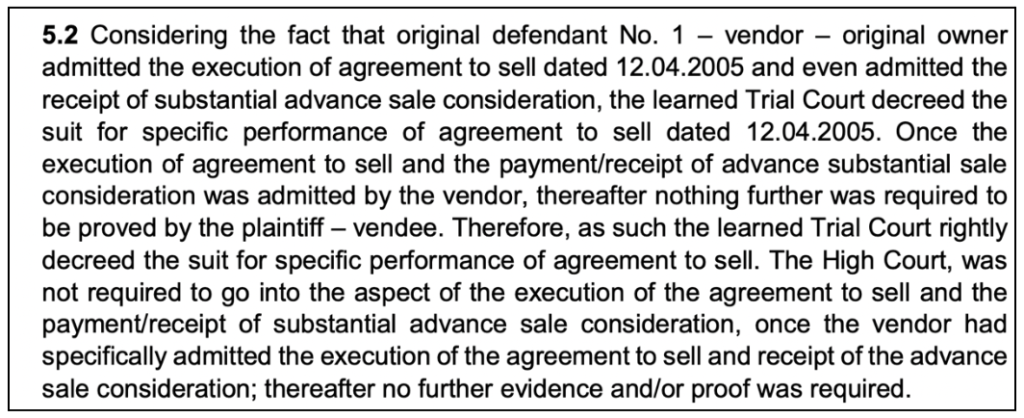
The Supreme Court was also of the view that the High court could not have quashed the decree of the trial court on the ground that there was no specific cancellation of the sale deed executed in favour of the subsequent purchasers.
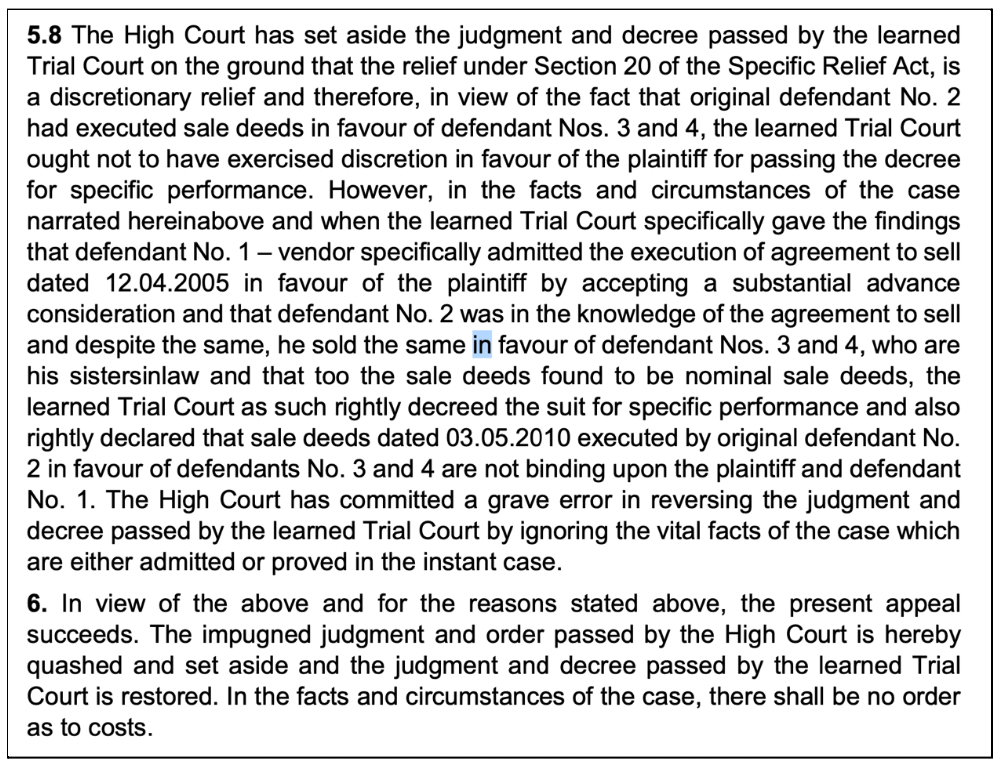
Featured Image: Important Court Judgements


